Today I was thinking about this interview I did last year with Make up artist Alex Box, and I wondered why I hadn't put it up yet. So I am!
Alex, who is the designer behind the Illamasqua make up brand, is actually one of the most interesting and coolest women I have ever ever met. She's also an incredible interview subject because everything she talks about is so detailed, and there was hardly anything I wanted to cut from the transcript. It was actually very hard to fit it into my 2,500 word limit. Alex has worked with people from the legendary Karl Lagerfeld (who she says is nothing like his rep) to Gareth Pugh, and is really quite an inspirational character.
Initially I wrote the interview into a profile (and a very good profile it was too) for my university paper, but I destroyed my laptop a little while ago and I only did so much backing up... so the transcript of our conversation is all I have left... sob. I know it's very text heavy but I've tried to break it through with photos of Alex's work (a lot of photos), plus her description of Karl Lagerfeld is worth sifting through the text!
So, you studied at Chelsea College of Art, what was your time there like?
Amazing, actually. It was…incredibly emotional. Because you go through the whole thing of leaving home, and then you go through embracing a new city, and discipline and Chelsea was very… it wasn’t like Goldsmiths, in the sense that they were much more savvy about making an earning out of art, whereas Chelsea still had a bit of that 60s hippy-ness, so it was very much about it coming from the heart - really embracing being an artist as a lifelong thing, and less about making money.
I really found that the whole time I was there I really explored who I was and what I was capable of, and also I started there painting and kind of left as an installation artist…I absorbed all the sectors and developed and I was really into the sculpture department, that was amazing.
I really found that the whole time I was there I really explored who I was and what I was capable of, and also I started there painting and kind of left as an installation artist…I absorbed all the sectors and developed and I was really into the sculpture department, that was amazing.
And was what your most memorable experience there?
Now and again, very rarely, they would pick three students to do a show downstairs, and I was picked. It was my first real taste of being in the spotlight for what I do... and I think that I...got…the bug! [Laughs] Got the bug for being…centre stage, definitely.
How do you feel that the Fine Art course helped with your make up?
Massively. If anything it was a complete straight line from one to what I do because it's - I mean it sounds a bit goush - but it’s just like painting on a different canvas, you know, it’s a face. If anything, I'm much more of a painter now then when I was then! Because I think you get sucked into styles a little bit and you’re aware of peers, and colleges have their own styles, but now that I'm here it’s much more like excessive painting, like abstract painting. You just pick up colours and you go with it, and you might have a form but it changes shape and it finishes where it finishes. It’s so much like painting. You go into quite a meditative state. It comes from somewhere else.
And yours is especially artistic; it’s so intricate.
Yeah, yeah it is. And the fact that it’s moving too [unlike a painting]. I mean, I love fashion shows for that, because you can do something, and it’ll walking past someone. I make masks. I’ve used lots of techniques I've learnt in my artwork and sculpture defininitly.
Did you always want to be a make up artist?
Not at all, no. It was very very natural progression, almost seamless without me even noticing. I after college I went to work for a make up brand because I needed to earn money to pay for my art work. And I was very elaborate in my own make up. I loved make up myself, and my friend who used to work in the body shop said, 'You do your make up so well, why don’t you come and work for us?', and so I did. And I thought ‘what’s the difference between this paint and paint paint?’ Cause I used to really, go into the hair…and down the back. It took me a long time before I even thought ‘yeah I'm a make up artist’. Cause I never trained in it, and it’s not really meant to happen that way. But I got more popular, and I started getting more jobs and I thought, well that’s what I do.
So, how did the whole range come about?
Well, a chap called Julian Kiniston who is head of an advertising company called Propaganda, based in Leeds saw a picture of one of my looks - a really intricate, black, body with really frantic stuff going on. And his wife said they were looking to make a make up range and they had no idea who to head it… and all they had was a motive, artistic, quite dark, gothic, burlesque make up range. And they saw that [picture] and they said, can it be you that does it, are you interested, and I totally was cause I'd been thinking about [how] there’s such a gap in the market. It was great that it both came together. Becasue I’d been thinking about it, but how on earth could you, do it, fund it, you know.
Illamasqua is very gothic and dramatic, and you said burlesque, that’s a great word to describe it. So where did the inspiration come from, is it your own personal style or was it something else?
Theirs and mine are both very similar, they’re aesthetic, he’s an old Goth and they'd done lots of research into subcultures like piercing and they felt that anything on that slant was not catered for. I mean there’s MAC, but they really didn’t feel that there was a make up range that was emotional led, brand led. It’s product led, so they know juicy tubes and touché éclat but nobody really says you know, 'Chanel really says something to me'. Without boring you with the marketing details, it's like, people like Nokia or they always buy a brand of coffee or whatever, but they don’t have 20 different coffees, from different brands, people stick to that because they like the brand. But with make up, women have an average of 13 different brands. There’s no one brand that we’re attached to.
Loyal to?
Yeah, exactly. It’s very interesting, so basically they had the concept and then got me, instead of the other way around.
I know you’ve done some catwalk shows. Which was your favourite?
Definitely Gareth [Pugh]’s. I mean, the last one was amazing. My most favourite Gareth Pugh one though was... about 4 years ago, it was no make up at all, I just did all sculptures on masks, and that really brought me back to art school. It was so completely about making sculptures and people wearing them, it was all made from whatever I wanted to do. And I loved that…so much. It was so great. It made me think of so many possibilities opened a lot of doors in my head that I’d kind of closed.
I also saw that you worked with Karl Lagerfeld. He’s got a reputation as a... big character. What is he like?
He’s amazing. He’s incredible. He’s a true original. I worked with Karl a lot; I still do work with Karl a lot. He’s such an incredibly imposing figure in fashion and in the world, and he’s quite an enigma because he never really says much about himself and with the glasses and everything, but he’s actually incredibly vivacious, kind, interesting man who’s just buzzing. He’s so young in his mind. He’s got a trunk full of iPods with everything on them, he’s got this underground bunker full of every CD you can imagine, he constantly updates it with everything new in art, and everything new in fashion. He’s just a real pioneer you know, and he really feeds his mind with everything that’s new and he's just a very inspirational, infectious character to be around. He loves dressing up, and black and white, and you know he always has the suit, the glasses.
Was he easy to work with?
Totally. One of the easiest people ever. He’s a complete contradiction because he definitely has developed a character to just get by with I suppose, because he’s actually not... you think he’d be a premaddonna but hes not. He’s actually very pleasant. Really takes care of you as well, has his chef feeding you the whole time and yeah he’s lovely. He’s so fun. And I think he’s obviously in the latter stage of his life and career and still absolutely brilliant and vivacious, but age doesn’t matter that much. Because some people are tyrannical whereas he’s like 'come on, we’ve got to go home', that kind of thing. He never takes his glasses off, even to take pictures, he kind of lowers them a bit, but behind them are the kindest eyes you’ve ever seen. So I think that’s why he wears them cause he just looks [too nice otherwise]. And people are really scared of him definitely. But him himself, he’s just so touchy feely and he’s lovely.
Whose make up, dead or alive, would you love to do?
That’s a good question…hmm. I think... I'd like to do Joan Crawford. Cause I know she mental, I’ve read so much about her, I love the routine she had. I mean those old stars weren’t natural beauties, and it was really about make up. And they worked so closely with their make up artists and had their make up artists for life. And they’d design all these weird techniques and things, and I love that period of time when it was really all about - there wasn’t so much surgery - so it was all about creating something out of the bare minimum... and they had all these weird tricks. A really old Hollywood movie star.
Are you really into old Hollywood then? You’ve got the red lips, the black eyeliner, the eyebrows…
Totally, yeah [laughs]. Absolutely. And Jane Crawford and Leigh Bowry I’d really like to do as well.
I suppose that time was the most artistic phase make up went through, because it was actually painting on lips, they had to really work hard to create beauty when there wasn’t any.
It’s weird because there was surgery, people don’t realise, but not like now. It's not that 25 year old have surgery, then you’d have tapes and lifts and your wigs and camera angles and all that. They used to make things out of wax and putty and put them down the sides of their nose, it was amazing. It was a real art form.
Is there any advice you’d give to any students that want to break into the industry, how to succeed?
Um... just to... it sounds silly really... but just to don’t dream it, be it. I think that, if you do that thing of faking it to make it, you have to just put yourself in that situation and if you - no matter what people say to you - if you’ve got a vision keep knocking on that door. You know, because it's ever so easy to just go under coz its really difficult, but just keep thinking it's gonna happen because it has to. If it doesn’t what else are you gonna do? In the sense of, you’re an artist and it has to happen, you have to believe in yourself 100%. And be really tenacious and actually very brave with your beliefs in that way. It’s so incredibly easy to get knocked down, I’ve felt like that. When I used to make 20 phone calls to the same people. I used to have a list of names and I just rang them pretty much every day and even when it felt like I wasn’t doing anything, I had that to do. You have to be really disciplined.
You can’t just think you’ll fall into it.
If it does, there’s something wrong! If you do get things like that, you won’t appreciate it and you won’t work with it and it will go again. That’s the thing, it comes as it should. And I realise that know after 11 years of it, that everything has come when it should have done. If this had happened when I was 22 I probably wouldn’t have been able to cope with the pressure of it. The thing is now I think people are so much more media savvy and there is that ‘I want fame now, I want it to happen now, I deserve the best’ and you do, but you also have to work really hard because its such a microclimate in college because you have the college stars and you do well and you rise to the top think that’s how it is. And then when you come out, you have to start all over again.
Coming back to college - since our university is so well known and there are so many successful people to come out of it, do you think that going to Chelsea has helped you more then if you’d gone somewhere else?
Definitely. Especially where Chelsea was - on the Kings Road, just walking down the Kings Road, being around the centre of London, And also being in such a fashionable place, whether I liked the fashion or not, was very important, and also the teachers or lecturers there were very much about getting the active artists there who had just left college. I used to have Jason Denous be my tutor, I met Brian Eno, all these people, really fundamentally incredibly inspirational people.
I think Chelsea and Saint Martins have really got that thing where they’ve still got that glamour to them, and I think when you know that your college is doing well and it's revered it makes you proud to be there. And it’s so hard to get into. And so if you got into them you felt proud. Especially me, coming from a small town (Grimsby) we were really pushed to go to London, you know like, 'If you're gonna go for it, go for it, don’t be all [makes face...] "nahhhh". Just do it.' I was nervous and I was thinking ooh Loughborough, maybe Birmingham…and then my friend said to me, if you are gonna move away, just go for it cause you'll really resent not. Then when me and the other person I went with got into Chelsea I felt like I’d really achieved something. And also that... you just felt glamourous. It was a glamorous college, people looked good, they worked hard, and you felt it had a lot of history behind it.
I think Chelsea and Saint Martins have really got that thing where they’ve still got that glamour to them, and I think when you know that your college is doing well and it's revered it makes you proud to be there. And it’s so hard to get into. And so if you got into them you felt proud. Especially me, coming from a small town (Grimsby) we were really pushed to go to London, you know like, 'If you're gonna go for it, go for it, don’t be all [makes face...] "nahhhh". Just do it.' I was nervous and I was thinking ooh Loughborough, maybe Birmingham…and then my friend said to me, if you are gonna move away, just go for it cause you'll really resent not. Then when me and the other person I went with got into Chelsea I felt like I’d really achieved something. And also that... you just felt glamourous. It was a glamorous college, people looked good, they worked hard, and you felt it had a lot of history behind it.
Are you still proud of it now?
Yeah, totally. Because also a lot of people who went to Chelsea were sort of poser girls who were just wasting a couple of years (and you saw that straight away) but then you also saw the people that really wanted to be there and they've gone onto do things. And that’s the same as life, you know the people who are going to do things are appreciating their surroundings and take that and use it to do something for good, whereas people that haven’t…don’t. Or take it for granted. I met some great people there. I met great people through all the colleges.
So you came down from Grimsby and you live in London now. What do you like best about London?
Oh god, everything. It’s really funny; I was thinking the other day, other then New York I really couldn’t see myself living anywhere else because it’s just a massive place but so small at the same time. I can sit in a coffee shop in the centre of town and see more people then I ever would back home and its kind of it feels so much like home, and its always moving, and its so vivacious, and its so charismatic. I think also because the water runs through the middle, it feels like its being renewed all the time. I travel a lot, I go away to Paris a lot, which is absolutely stunning. And I come back to London and London always feels so young, and I know it’s a cliché but it does, it rejuvenates itself. And the fashion here’s amazing. We really don’t realise it until you go away anywhere else, and you come back everybody, every kid, looks cool. They've got some look going, you know? It’s just not like that anywhere else. It really isn’t. And its different everywhere, like London is made of little villages. All stuck together. It’s really defined by that, it’s incredible. Especially now more so with everyone having some sort of adornment, you know plugs and stretching, hair colour. I absolutely love it.
And there’s no better place to be really, if you’re an artist.
London is just very much full of the people who were attractive or courageous and really wanted to leave the tows so London’s full of a nice pick of small towns. People took what they had here. My town's full of old friends and it's lovely, but it was also narrow-minded, quite prejudiced and not inspirational. Where else are you gonna go, if not London, if you’re drawn by shiny things?!
Do you go back to Grimsby a lot?
Not really, I go about twice a year. My family and my friends still live there.
I suppose it helps you stay down to earth though, grounded.
Yeah I love it, because there so extremely not like the people that I know here, or work with, who I don’t associate with [all the time] I mean I’m not hanging out with Karl Lagerfeld at night! But it’s lovely that, between that complete dichotomy of ‘shut up, you’re up yourself’, to ‘ahh Karl Lagerfeld!’
Back to the make up, obviously you had a lot of input into how it looks, the shades and everything, but how did that work?
I went back to colour wheels and Panton books actually. I initially made swatches of anything from newspapers to bits of material, of colours that I like, and wanted, and as a make up artist know that I need. Existing colours I had, but maybe wanted a bit more of this, or that, and then I had to make Panton references and I matched them as close as I could and then I went to the place in Berlin where they make them and then we just changed them until it was right. In general we’ve got about 125 eye shadows.
I had to narrow it down from 200, which was insane because nobody even owns 125 eyeshadows, let alone 200. I’m so in love with colour. So when they said you can have colour, I was like [makes excited face]. But we’ve got the most amazing blue lip gloss and luminous green lip-gloss and dark weird matte nail varnish. We’ve made it so the pencils can be used anywhere on the face, I wanted it as much like an artists palette as possible. So the pencils are eyes, lips, freckles, eyebrows, and you can use them anywhere, you can use the lip gloss on your eyes. We wanted to explode those boundaries where people said 'this has to go here', and say 'well no, this can be used anywhere.'
And for my last question… what three things would you take on a desert island?
I have thought about this actually. I would take…my boyfriend. I would take…you can’t take a limitless music catalogue can you?
Yeah you could, an iPod that had infinite memory.
Yeah, and that had a satellite link up that was constantly recharging and updating and had the biggest back catalogue in the world. And I would take a boat in case I wanted to get off the island! Well, then you can always go and come back.

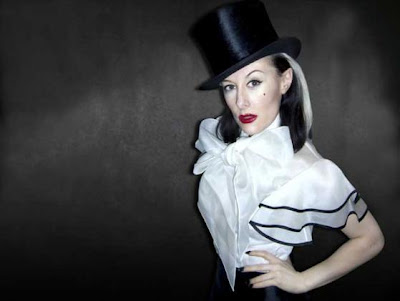
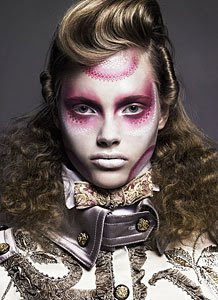
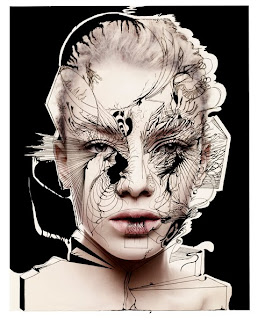
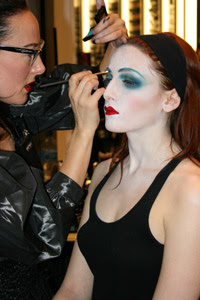




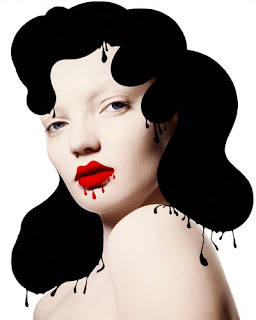

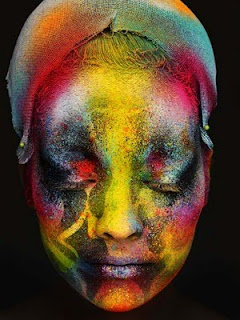
2 comments:
an excellent post! Lovin Alex Box my fellow makeup artist! <3
wow this is really cool art! =)
Post a Comment